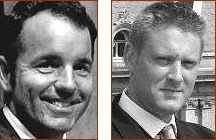August 2009: Government Affairs
Words: Dan KamysAugust 2009
A Look at Healthcare
 Matthew B. Keelen and Michael J. Falencki
Matthew B. Keelen and Michael J. Falencki
With the stimulus package in process and climate change passing the House and being considered in the Senate, Congress – with mounting pressure from the Administration – turns its focus to comprehensive healthcare reform. In June alone, the Senate Health, Education, Labor and Pensions Committee has reported a bill, and the House is expected to pass legislation before the August recess.
H.R. 3200, the America’s Affordable Health Choices Act, seeks to provide affordable healthcare for all Americans and control healthcare cost growth. Much of the current legislation focuses on expanding coverage and choice; affordability; shared responsibility; controlling costs; providing preventive services; and investing in the healthcare workforce.
The bill currently stands at 1,080 pages, before the relevant committees begin their mark-ups. So what does the bill mean for the businesses of the MCAA?
The bill would create a health insurance exchange, which would act as a marketplace for individuals and employers to shop for insurance. Along with private insurance plans, a new public health insurance option will be present. An essential benefit package, as determined by a new Advisory Committee, will serve as the baseline package for the minimum benefits that must be offered.
Medicare and Medicaid will be expanded, and affordability credits will be available for lower income individuals and families, so that every American can have health insurance. All Americans will be required to have health insurance, unless they have a hardship exemption. Otherwise, those who choose not to have insurance will pay a 2.5 percent penalty tax of modified adjusted gross income above a specified level.
All employers must either provide health insurance coverage or contribute funds on their behalf. Employers choosing to contribute will have to provide a contribution based on their payroll. Any businesses with payroll not exceeding $250,000 are exempt. The phased-in contribution begins with 2 percent above $250,000 payroll, and rises to 8 percent for businesses above $400,000 payroll.
American families earning between $350,000 and $500,000 will pay a surcharge of 1 percent to help pay for healthcare. A 1.5 percent surcharge is in place for family income between $500,000 and $1 million. If the projected healthcare savings are not obtained, then that surcharge will rise on a sliding scale.
The bill also would limit the amount of co-pays or deductibles, and enact a cap on annual healthcare spending by families. It prevents coverage being denied for pre-existing conditions, and coverage will include mental health services and other formerly optional coverage.
There is much controversy over the public option plan, as detractors argue that with caps on spending and mandated benefits, private insurers will reduce their coverage levels, and Americans may lose benefits. Also, a public plan may lead to government-run healthcare, as private insurers wouldn’t be able to compete with the federal government and may be forced to participate in the health exchange. Many questions about the rationing of healthcare also persist.
The House, and possibly the Senate, could pass healthcare reform legislation by the August recess. Many issues are likely to be debated, although amendments may not be made to the bill itself. We will continue to attend the hearings and keep the MCAA and Masonry readers apprised of any developments on this sweeping legislation.
Return to Table of Contents